Year 12 Chemistry
Boost your Chemistry marks and confidence with structured courses online or on-campus.
Learning methods available
Select a year to see available courses

Guide Chapters
We know balancing the practical side and knowledge side of Science subjects can be difficult! So, we’ve asked our high achieving graduates and students to share their top hacks to overcome this challenge.
Take a read of their common (and very useful) general advice and view case studies of individual student’s unique advice.
At the end of the article, we also provided a table of all of our Science articles written by our guest authors.
The Sciences are very different from Maths and English!
Many students find it difficult to balance the practical skills side and knowledge section of the 3 Sciences.
This is why it’s very useful to take a read of high achieving student’s advice to see how they managed to overcome this challenge to ace Science!
Remember, everyone has different study preferences.
Maybe, you’re more Mathematical. So, you might enjoy doing calculations and derivations. Or, you may be a more visual learner! So, you might prefer drawing flow charts and diagram to sort information.
Well, this is why it’s beneficial to take a read of our Success Secret articles! Our guest authors all have different study habits. So, you will surely find something useful that will fit your preferences!
Take a look at all of our Science Success Secret articles.
We’ve collated some useful tips that many of our guest authors shared in their articles.
The most common issue that students come across when studying for Science is not knowing what the question requires you to do! We know. Science questions are very ambiguous.
This is why the guest authors noted the importance of knowing your syllabus, marking criteria and NESA key verbs.
Knowing these elements well will help you break down the question and know exactly what you need to write!
So, let’s go through these in more detail:
1. Know your syllabus
Before learning the content, Martina’s Chemistry, Biology and Matrix teacher will always break down the syllabus dot points.
This is because exam questions often cover multiple dot points. So, understanding the syllabus helps her identify every dot point she needs to engage with to achieve full marks.
As Martina says, the syllabus is “NESA’s way of dropping as many hints as possible” about the exam!
Rohan also notes that knowing the syllabus in “extravagant detail” will help you add enough detail to impress the markers.
He highlights the importance of learning examples for different syllabus dot points to add extra depth in your answers.
2. Know your marking criteria
In Year 11, Sid lost marks because he didn’t tailor his responses to the marking criteria. This is a common issue that all Science students come across!
So, Sid recommends writing notes that reference NESA’s marking criteria! This means that you will need to go through past paper, read the marking criteria for different types of questions, and take notes!
Doing this will ensure that your exam responses address the marking guidelines to achieve full marks!
Ashish also advises you to de-construct the question, consider the mark allocation, and plan out long answer Science responses before you write them! This helps you build your confidence and achieve full marks.
3. Know your NESA key verbs
For the Science subjects, Martina found that there is a big emphasis on NESA key verbs in the questions.
It helps you determine how much detail you should write, and how effectively you can answer it!
Martina also had a table of key words from Matrix that is stuck to her desk! Each time she needs a refresher on the definitions, she would take a look at it!
Justin also gave an example of using NESA key verbs appropriately. He notes that ‘explain‘ questions requires you to link a cause and effect.
So, in your responses, you should aim to describe an element, then link it to the effect.
This will help you write concise, but “extensive responses that clearly demonstrates the understanding of the question“.
When studying Science, Wasim highlights the importance of learning exam techniques, and not just simply memorising the content!
People can easily memorise content, but not everyone can write eloquently and appropriately
So, let’s go through some key exam techniques that our guest author has shared:
1. Learn to deconstruct questions quickly
Samantha found that most short-answer questions “tend to follow the same structural patterns”.
So, she advises Science students to always highlight the key components of a question (Key verb, topic, connective words etc.)
This will help you identify the necessary facts you need to include in your response to directly answer the question.
2. Practise, practise, practise
Most of our guest authors highlighted the importance of practice!
Karen suggested progressing through your past papers by:
Shelley also followed a similar structure. She went through the papers and mentally answered the easy questions, and wrote down more difficult ones.
This meant that she was able to complete 5 past papers a day, and expose herself to a variety of questions.
Samantha also suggested using your time wisely and effectively to answer different types of questions! For instance, 1 mark questions = 1.5 minutes – 1 concept/syllabus dot point.
This will help you finish your exams on time!
Save time to get ahead of your Chemistry studies! With Matrix+, our HSC experts will break down Chemistry concept through our structured online videos, and answer your questions on the Q&A boards! Learn more about our Matrix+ Online Course now.
Start HSC Chem confidently
Expert teachers, comprehensive resources, one-to-one help! Learn from home with Matrix+ Online.
Now that you’ve read some useful Science tips, let’s take a closer look at some of our student’s Science tips.
Let’s have a look at 3 case studies:
Martina is a St George Girls and Matrix graduate. She is studying a Bachelor of Oral Health at the University of Sydney.
She was ranked 48 in Chemistry in Year 11, and ended 1st in the grade by the end of year 12!
So, let’s see what she did to boost her marks!
There is “too much content in the Science syllabus to rote learn!”
So, it’s more important to develop a strong fundamental understanding of the topics, instead of merely memorising it.
Study smart, not study hard.
As Martina said, studying hard is memorising everything. It will be difficult and takes a lot of time.
Instead, Martina suggests:
And if there are areas where you need to memorise content, Martina suggests:
Martina saw many students use extensive long notes as “summaries” to study before an exam.
However, this is an ineffective way to study.
“When it comes to studying, reading “notes” again and again is not the way to do it”.
She notes that the HSC is very content heavy. So, purely studying from notes means that you aren’t properly compartmentalising information to apply it to the questions.
So, she suggested that using Matrix Chemistry and Biology books as summary notes, and writing summaries on a sheet of paper.
Martina did this by drawing/writing:
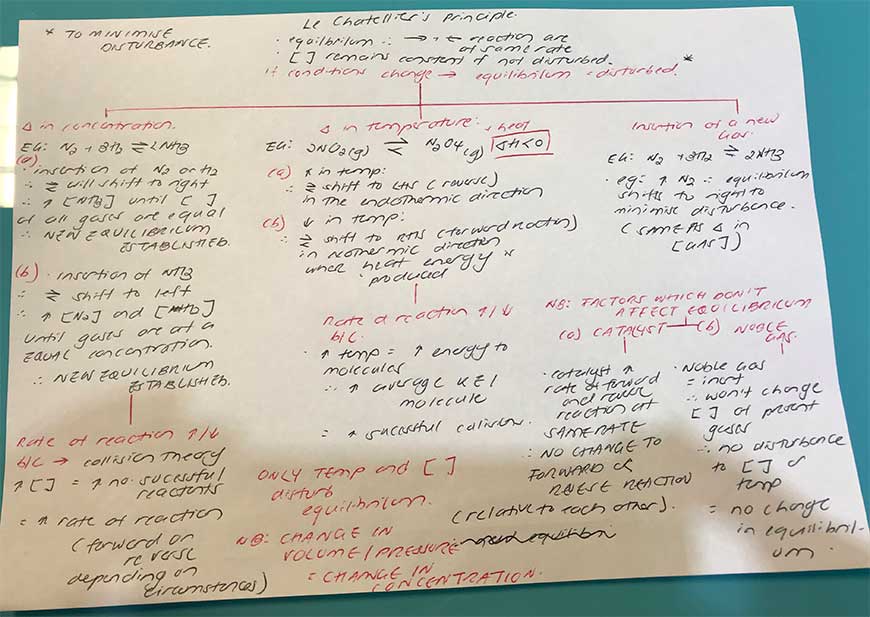
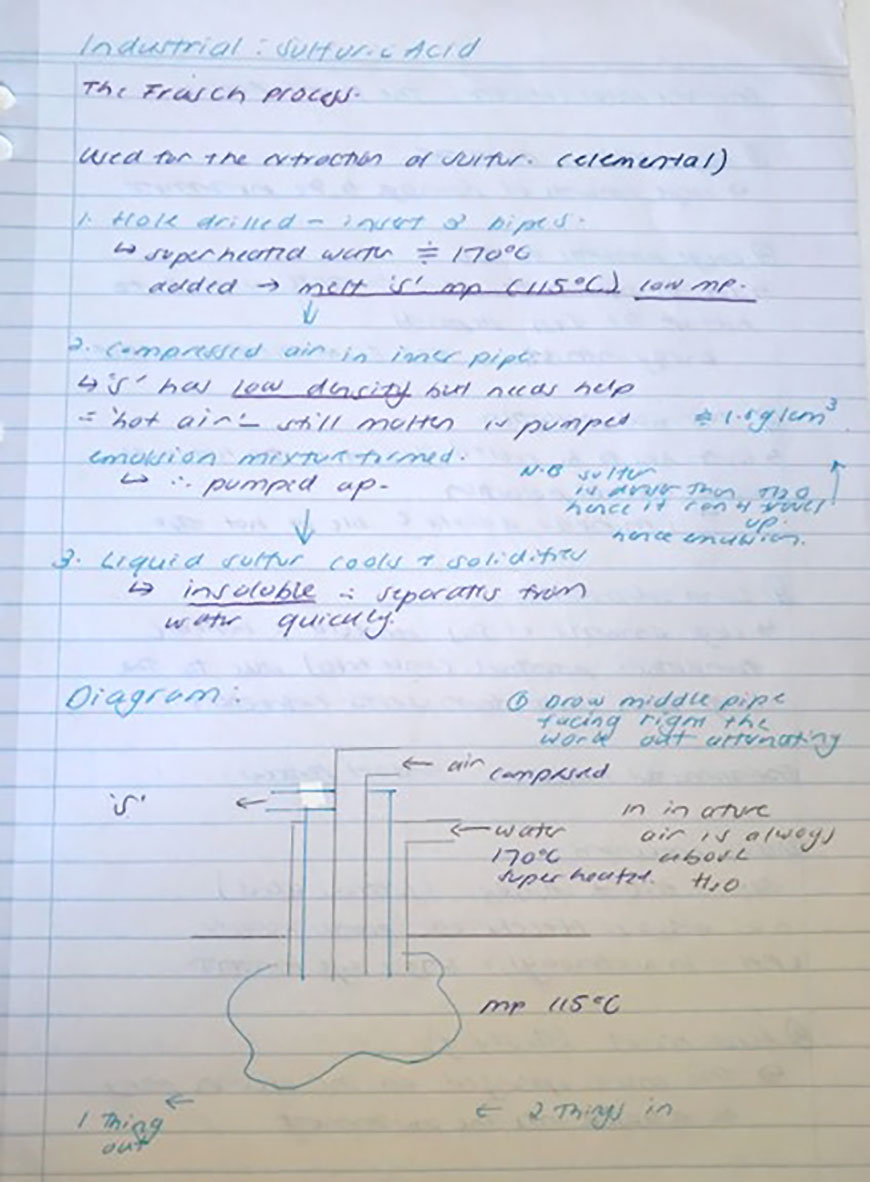
Read the rest of Martina’s article to learn more Science tips to see how topped Chemistry: Martina’s Hacks: How I Went From Ranked 48th to 1st in Chemistry
Justin is a Knox and Matrix graduate. He aims to do Medicine or something health related in University.
He completed all 3 Sciences for the HSC: Biology, Chemistry, and Physics.
In Year 11, his number one problem was not having an extensive understanding of his Science subjects. He soon realised that the Sciences require in-depth responses with structures similar to Maths proofs.
So, with this newfound understanding, he began to adopt new study techniques to turn his Science marks around!
Justin found that the teachers are the most useful person to ask for anything!
“Ask the teacher for feedback. Ask them to mark your practice responses. And ask them if you hit all the criteria points”
You should also share your answers with your peers and mark each others’ works!
To do this, you should both examine the marking criteria carefully before you begin marking. This will help you identify each other’s flaws and give appropriate feedback
However, receiving feedback is not the final step, you need to also improve your answers!
Apply the feedback to your own work until you feel confident that you are writing a full-mark response.
You don’t want to write a response, only for the marker to get confused and not give you the marks you deserve.
As such, Justin emphasises the importance of doing practice questions and marking it!
He notes the importance of being concise, and using subheadings to help clarify your response.
However, writing responses without marking is just cheating yourself!
You need to use a marking criteria, think from the perspective of the marker, and mark your work.
Don’t be nice to yourself. Instead, ask yourself “would a marker who has to mark thousands of papers read this and this it is as good, or better than all the others?”
Read the rest of Justin’s articles to learn his top Science tips: Justin’s Hacks: The 3 Steps I Used to Improve My Science Marks
David graduated from Barkers College and Matrix with a 99.95 ATAR and 4 State Ranks for Physics, Chemistry, Maths Ext 1, and Chinese and Literature.
He only had 2 days to revise for his Physics exam. So, it was shocking to hear he state ranked! However, this goes to show the importance of daily effort and consistent hard work.
In his article, David shares some of his best Science tips he used to come 1st in state for Physics.
Science experiments are a major focus of the syllabus. So, David knew that it was crucial to understand and remember the experiments clearly.
So, he suggests that you write detailed summaries which documents all aspects of the experiment.
This includes:
These are good revision notes to refresh your brain before your exams.
Here are some examples of summary notes for photoelectric effect experiment:
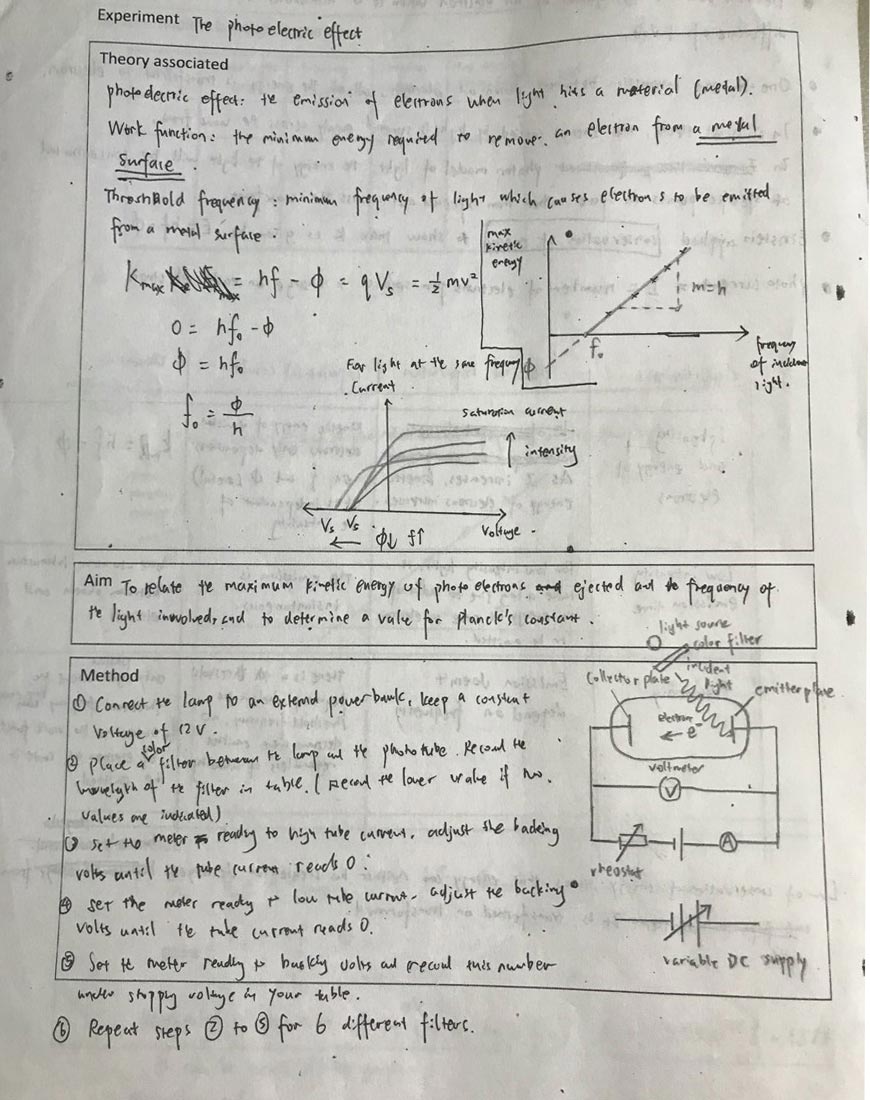
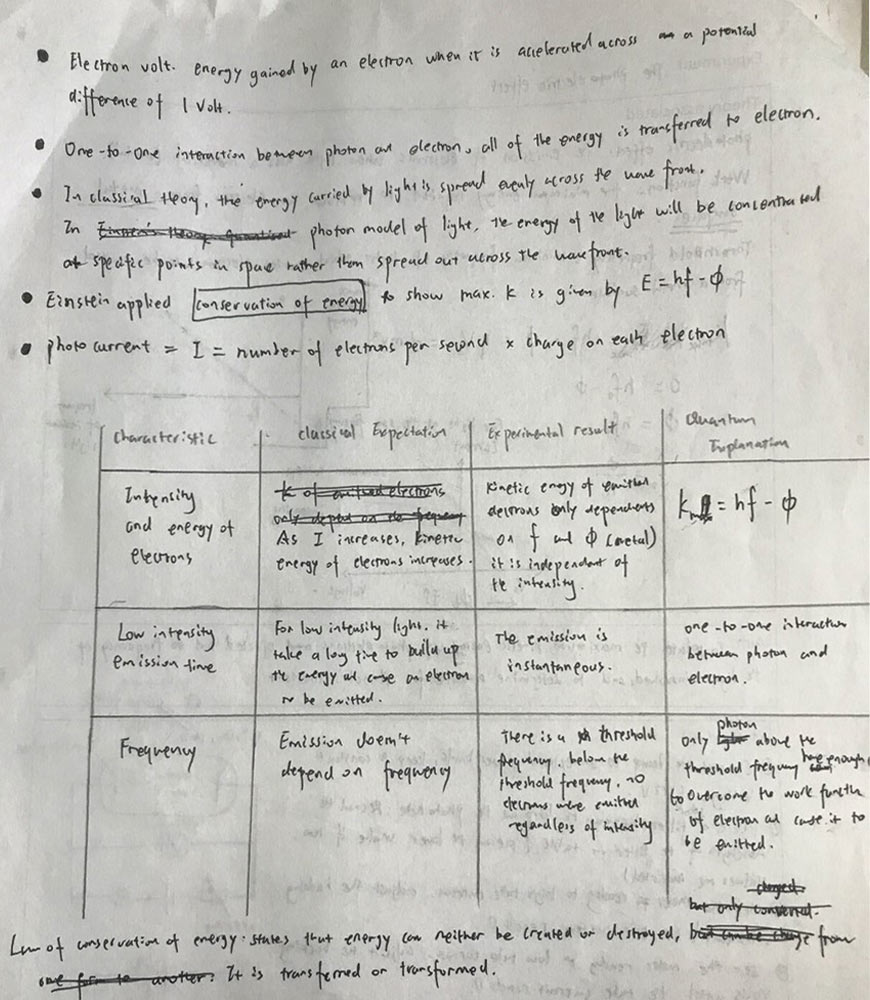
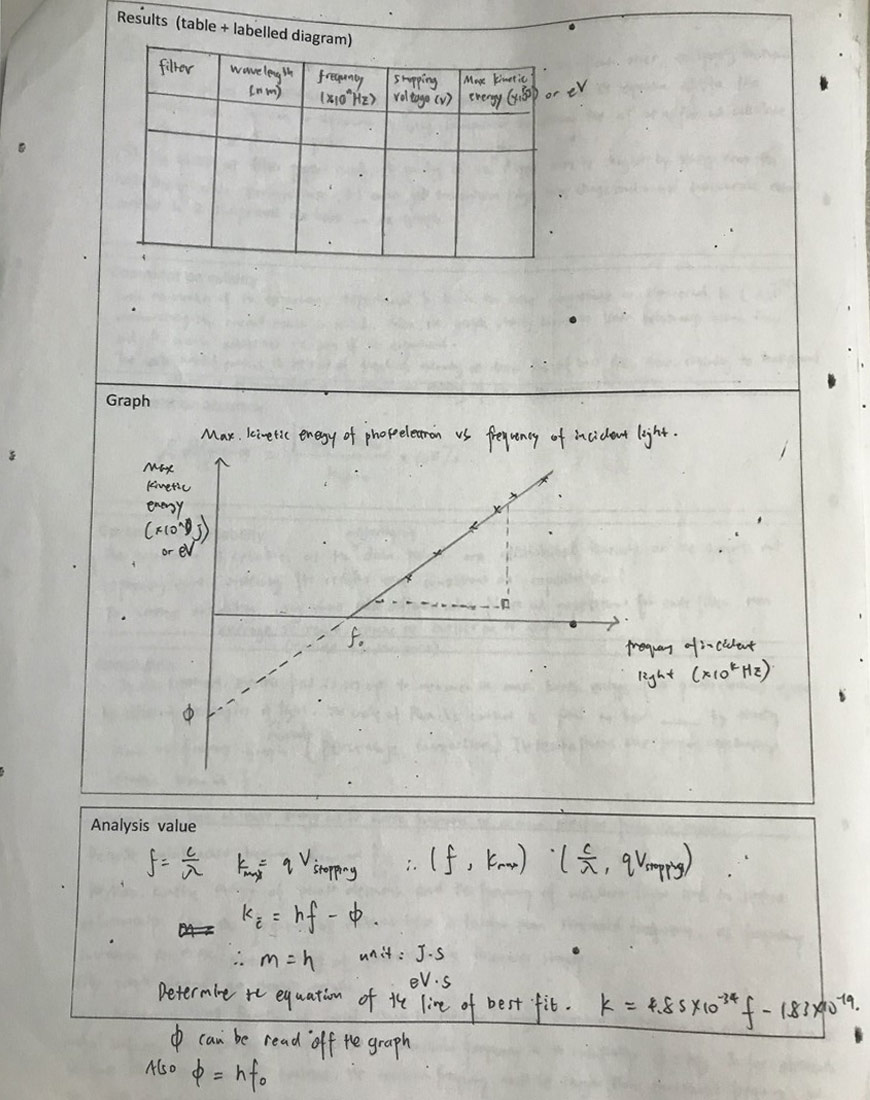
David’s unique Science study methods is using mathematical derivations.
Deriving formulas are also useful at helping you identify connections between different topics, especially Physics.
It is crucial that you are draw connections between everything in the Sciences.
This is because formulae, equations, and theories are always integrated into a consistent theoretical framework.
For instance, the Rydberg’s equation can be derived from Bohr’s postulate.
So, David suggests that you always ask these questions when you encounter a new formula:
This will help you derive formulae to figure out interconnections.
Take a read at the rest of David’s article to see his other useful Physics tips and his exam strategies: David’s Hacks: How I Came 1st in Physics and Achieved a 99.95 ATAR with 4 State Ranks
Take a read of all of our Science Success Secrets! We’ve sorted them out based on their subjects.
| Success Secret | What is it about? |
| Allen’s Chemistry Hacks for Scoring 97/100 and an ATAR of 99.95 | Allen shares his 3 main Chemistry hacks and 5 exam preparation tips he used to achieve a 97/100 for Chemistry! |
| Ashish’s Hacks: How I Scored An ATAR of 98 | Ashish goes through some useful Chemistry tips and general organisation advice to help you ace your Chemistry exam too. |
| Cecilia’s Hacks: Ace HSC Chemistry by Targeting Your Weak Spots | Cecilia details 4 main tips she used to target her Chemistry weaknesses, and shares some exam-taking advice. |
| Martina’s Hacks: How I Went From Ranked 48th to 1st in Chemistry | Martina explains 6 methods she used to boost her rank from number 48 to number 1 in Chemistry. |
| Ragulan’s Hacks: How I Achieved a Band 6 in HSC Biology, Chemistry and Physics | Ragulan shares some subject specific tips for Biology, Chemistry and Physics. |
| Rohan’s Hacks: How I Came First in NSW for HSC Chemistry | Rohan goes through his 4 top secrets to coming 1st in the State for Chemistry. |
| Success Secret | What is it about? |
| David’s Hacks: How I Came 1st in Physics and Achieved a 99.95 ATAR with 4 State Ranks | David shares 4 unique and useful Physics tips that helped him come 1st in the state. |
| George’s Physics Hacks: Physics Hacks for Year 12 Students | George goes through his 6 top tips to study for Physics and ace it. |
| Jay’s Physics Hacks: How I Scored an ATAR of 99.15 | Jay explains 5 useful hacks he used to ace Physics and score a 99.15 ATAR. |
| Kia’s Physics Hacks: How I Aced HSC Physics and scored a 99.15 ATAR | Kia shares 5 top advice to help you ace your Physics exams like she did. |
| Matthew Drielsma’s Hacks: How I Aced HSC Physics | Mathew discusses 3 core things you need to do to ace your Physics exams. |
| Ragulan’s Hacks: How I Achieved a Band 6 in HSC Biology, Chemistry and Physics | Ragulan shares subject specific advice for Biology, Chemistry and Physics that he used to achieve a 98.95 ATAR. |
| Wasim’s Hacks: How I Topped Physics at Fort Street High | Wasim shares his top Physics hacks he used to top the subject at Fort Street High. |
| Success Secret | What is it about? |
| Ragulan’s Hacks: How I Achieved a Band 6 in HSC Biology, Chemistry and Physics | Ragulan goes through specific Biology advice to help you write full mark responses. |
| Success Secret | What is it about? |
| Justin’s Hacks: The 3 Steps I Used to Improve My Science Marks | Justin shares 3 key Science study tips he used to boost his Chemistry and Biology marks. |
| Samantha’s Hacks: How I Scored An ATAR of 95.05 | Samantha goes through 5 best general Science advice she used to get ahead of her peers in Science. |
| Success Secret | What is it about? |
| James’ Hacks: How I Used Flowcharts to score a 99.75 ATAR | James goes through his process of using flowcharts to break down his Science topics to achieve a 99.75 ATAR. |
| Karen’s Hacks: How I Scored An ATAR of 99.95 | Karen shares some general HSC tips, and Maths, English and Science advice that helped her achieve a 99.95 ATAR. |
| Sherryn’s Hacks: How To Use Self-Reflection and Planning To Study Effectively | Sherryn breaks down her self-reflection and planning process that helped her study effectively. She also goes through some subject specific advice for Chemistry and Biology. |
| Sid’s Hacks: How I Scored An ATAR of 99.85 | Syd shares useful general HSC study tips and subject specific hacks for Science and English. |
| Sophie’s Hacks: How I Scored a 99.70 ATAR at a Non-Selective Co-Ed Public High School | Sophia shares exam taking advice, and subject specific advice for English, Maths and Science. |
| Stephanie’s Journey: How I Switched to a Selective School in Year 10 | Stephanie goes through her study habit changes she made to switch to a selective school. She also shares some subject specific advice for English, Maths and Science. |
© Matrix Education and www.matrix.edu.au, 2023. Unauthorised use and/or duplication of this material without express and written permission from this site’s author and/or owner is strictly prohibited. Excerpts and links may be used, provided that full and clear credit is given to Matrix Education and www.matrix.edu.au with appropriate and specific direction to the original content.